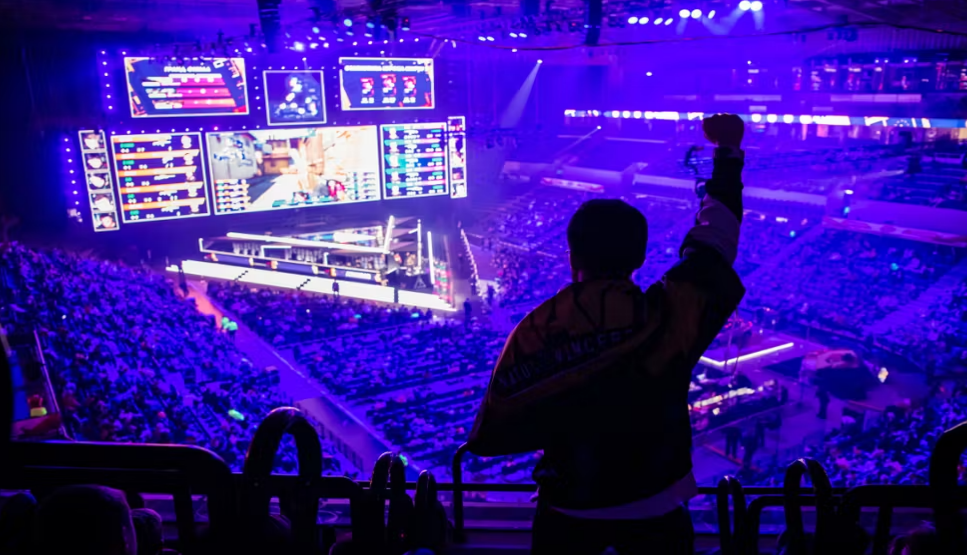Yes, you can bet on esports online. There are numerous licensed online platforms that offer betting options for various esports tournaments and matches, covering a wide range of games like “League of Legends”, “Counter-Strike: Global Offensive”, and many more.
Understanding Esports Betting
Esports betting has rapidly evolved from a niche market to a mainstream form of entertainment for millions. Like traditional sports, esports offers a variety of events and tournaments where fans can place bets on their favorite teams or players. Understanding the world of esports betting is essential for both fans looking to engage more deeply with the scene and newcomers curious about the hype.

What is Esports Betting?
Esports betting refers to the activity of predicting outcomes in esports competitions and placing a wager on that prediction. Just like betting on football or basketball games, fans can bet on various aspects of an esports match, such as the overall winner, the number of kills a player might get, or even the first team to accomplish a specific task in the game. The growth of the esports industry, coupled with the digital nature of the games, provides fans with a unique and interactive betting experience.
For more information about the concept of betting, you can refer to the Wikipedia page on Betting.
Major Esports Games to Bet On
The world of esports encompasses a wide range of games, but some have gained more prominence in the betting scene:
- League of Legends (LoL): A multiplayer online battle arena game where two teams compete to destroy each other’s base.
- Counter-Strike: Global Offensive (CS:GO): A first-person shooter where teams alternate between terrorist and counter-terrorist roles.
- Dota 2: Similar to LoL, it’s a multiplayer online battle arena game but with different heroes and gameplay mechanics.
- Overwatch: A team-based first-person shooter with a diverse cast of characters known as “heroes.”
For an exhaustive list of esports games, check out the Wikipedia page on Esports.
Differences Between Esports and Traditional Sports Betting
While the fundamental concept of betting remains the same in both domains, there are unique aspects to consider when betting on esports:
- Digital Nature: Esports matches are conducted in a virtual environment, meaning external factors like weather or physical injuries to players don’t play a role.
- Game Updates: Esports titles frequently receive game updates or patches that can significantly alter gameplay, introducing a dynamic layer to the betting strategy.
- Youthful Demographics: Esports generally attracts a younger audience compared to traditional sports, leading to different market behaviors and trends.
Legal Aspects of Esports Betting
The legal landscape for esports betting is complex and constantly evolving. Just like traditional sports betting, the regulations governing esports betting vary widely from country to country and even between regions within countries. As the esports industry continues to grow, regulators worldwide are grappling with how to treat this new form of betting, striking a balance between encouraging economic growth and protecting consumers.

Where is Esports Betting Legal?
Esports betting legality varies by country and sometimes even within regions of a country. Here are some general observations:
- United States: Esports betting is legal in some states like New Jersey and Nevada, but prohibited in others. Individual states have the power to license and regulate sports betting, including esports.
- United Kingdom: Esports betting is legal and regulated by the UK Gambling Commission.
- Australia: Esports betting is legal, but operators must obtain a license.
- China: Esports betting remains largely illegal, but the popularity of esports in the country has led to a burgeoning black market for such bets.
For a global perspective on gambling legality, see the Wikipedia page on Gambling Legislation.
Regulations and Licenses
Each jurisdiction that allows esports betting has its own set of regulations and requirements for operators. Some common considerations include:
- Licensing Process: Operators typically undergo a rigorous application process to demonstrate their ability to conduct fair and secure betting operations.
- Consumer Protections: Many jurisdictions require operators to implement measures to protect bettors, such as ensuring the security of their funds and personal information.
- Fair Play: Regulations may mandate the monitoring of esports competitions to prevent match-fixing and other forms of cheating.
For a deeper dive into gambling regulations, you can visit the Wikipedia page on Gaming Control Boards.
Age Restrictions and Responsible Gaming
Protecting young and vulnerable individuals is a priority for most regulators:
- Age Limits: The majority of jurisdictions require bettors to be at least 18 years old, but the age limit can be higher in some places.
- Self-Exclusion: Some jurisdictions offer or mandate self-exclusion programs, allowing individuals to ban themselves from betting platforms if they feel they have a problem.
- Warning Signs and Education: Operators might be required to provide information about the risks of gambling and resources for getting help with gambling addiction.
Platforms for Esports Betting
The digital nature of esports has given rise to a plethora of online betting platforms dedicated to this booming industry. As with any online financial transaction, choosing the right platform and ensuring secure operations is paramount. Navigating the vast sea of online esports betting sites can be daunting, but with the right information, you can confidently place bets and enjoy the thrill of esports competitions.
Popular Online Esports Betting Sites
There are numerous online betting platforms catering to esports enthusiasts. Some of the most prominent ones include:
- Betway Esports: Known for its broad range of games and competitive odds.
- Unikrn: Not just a betting site but also a comprehensive esports community platform.
- GG.Bet: Tailored specifically for esports, offering extensive game coverage and live bets.
- Pinnacle: One of the pioneers in the esports betting industry with a reputation for offering great odds.
For a detailed list of betting companies, you might want to explore the Wikipedia page on Betting Companies.
How to Choose a Reliable Betting Platform
Picking the right platform requires a combination of research and intuition. Here are some guidelines:
- Licensing and Regulation: Always choose platforms licensed by reputable authorities. Licensing ensures that the platform adheres to strict guidelines.
- User Reviews and Reputation: Checking reviews and user feedback can give you a clearer picture of a platform’s reliability.
- Payment Methods: A variety of payment options, including credit cards, e-wallets, and cryptocurrencies, indicates a platform’s adaptability and user-centric approach.
- Customer Support: Reliable platforms provide robust customer support to address user queries and concerns.
For more insights into how online platforms operate, see the Wikipedia page on Online Platforms.
Securing Your Online Bets
Safety should be your utmost priority when dealing with online transactions:
- Two-Factor Authentication (2FA): Always enable 2FA when available. It provides an extra layer of security by requiring a second form of verification beyond just a password.
- Secure Connection: Ensure that the website uses an HTTPS connection, signifying encryption of data between your browser and the server.
- Beware of Phishing: Be cautious of unsolicited emails or messages asking for personal details or directing you to suspicious links.
- Regularly Monitor Your Account: Regularly check your transaction history and report any suspicious activities immediately.
Strategies for Esports Betting
Navigating the realm of esports betting successfully requires more than just luck. Much like traditional sports, strategic understanding, comprehensive research, and analytical prowess significantly enhance your betting prowess in esports. With an industry so young yet so dynamic, the nuances of every game, player, and team play a pivotal role in determining the outcomes of your bets.

Understanding Game Mechanics and Players
Deep knowledge of the game you’re betting on is crucial:
- Game Rules & Objectives: Familiarize yourself with the game’s core mechanics. For instance, the objectives of games like League of Legends and Counter-Strike: Global Offensive differ immensely.
- Player Roles and Specializations: In team-based games, every player has a specific role. Knowing what each player does can help predict game outcomes. For example, in MOBA games, roles might include carry, support, or jungler.
- Individual Player Skills: Keep an eye on up-and-coming players and veterans. Some players have a history of performing exceptionally under pressure or during specific tournaments.
Analyzing Team Dynamics and Recent Performance
Team performance isn’t just about individual players, but how they synchronize:
- Team Strategy: Teams often have characteristic strategies or playstyles. Recognizing these can give you an edge in predicting match outcomes.
- Recent Performance Analysis: Look into the recent matches of a team. A team’s current form can be a significant indicator of their performance in an upcoming match.
- Inter-team Rivalries: Esports is rife with historic team rivalries. These games can be unpredictable and are driven by passion and pride more than just skill.
If you’re keen on diving deep into team strategies, the Wikipedia page on Team Strategy can provide some insights.
Risks and Potential Returns
Betting is inherently risky, but understanding potential returns can help:
- Odds Analysis: Familiarize yourself with how odds work in betting. Sometimes, odds might not accurately represent the actual chances, offering value opportunities.
- Staking Strategy: Determine beforehand how much you’re willing to stake and stick to it. Consider employing a Kelly criterion or a fixed staking strategy.
- Diversifying Bets: Just as with investments, diversifying your bets can minimize potential losses. Don’t put all your money on a single outcome or game.

